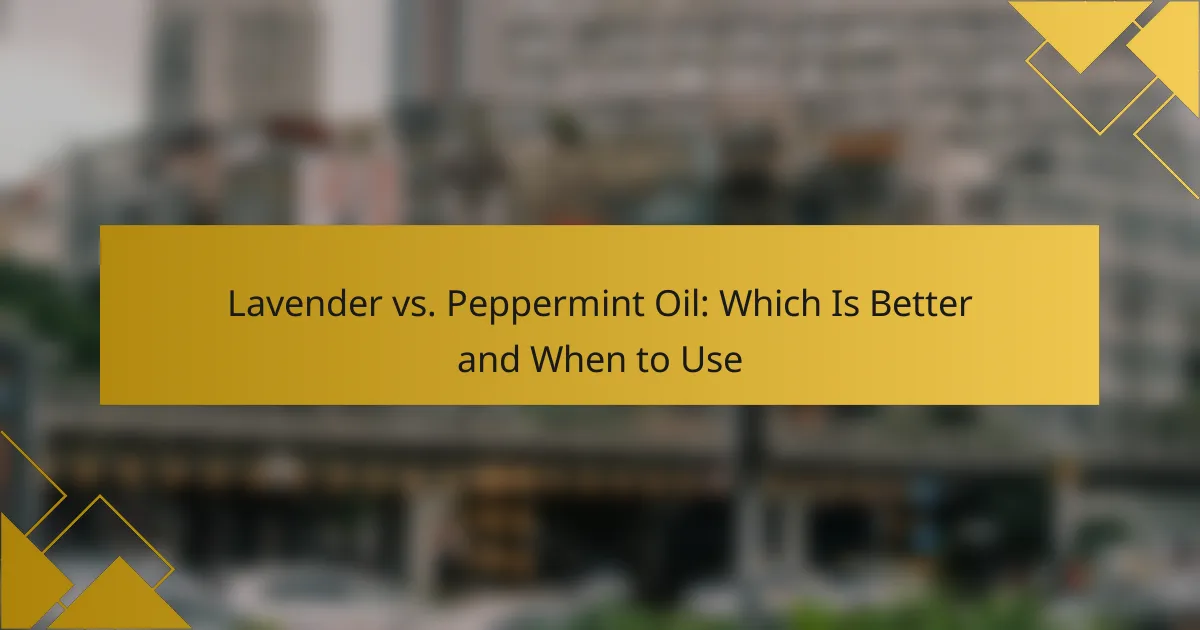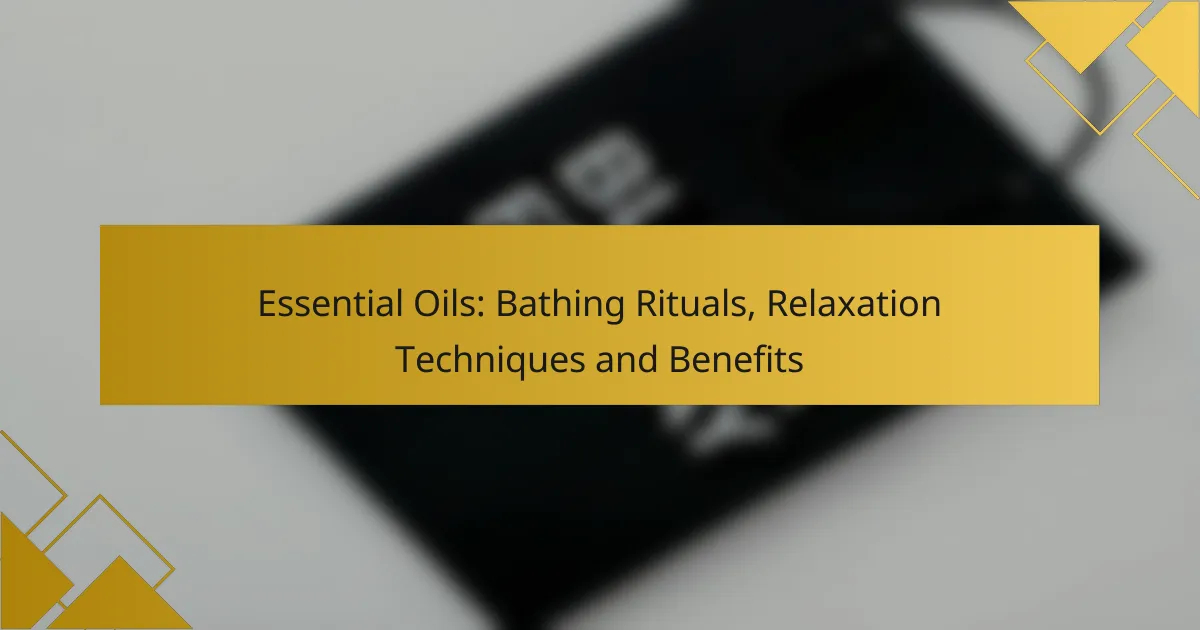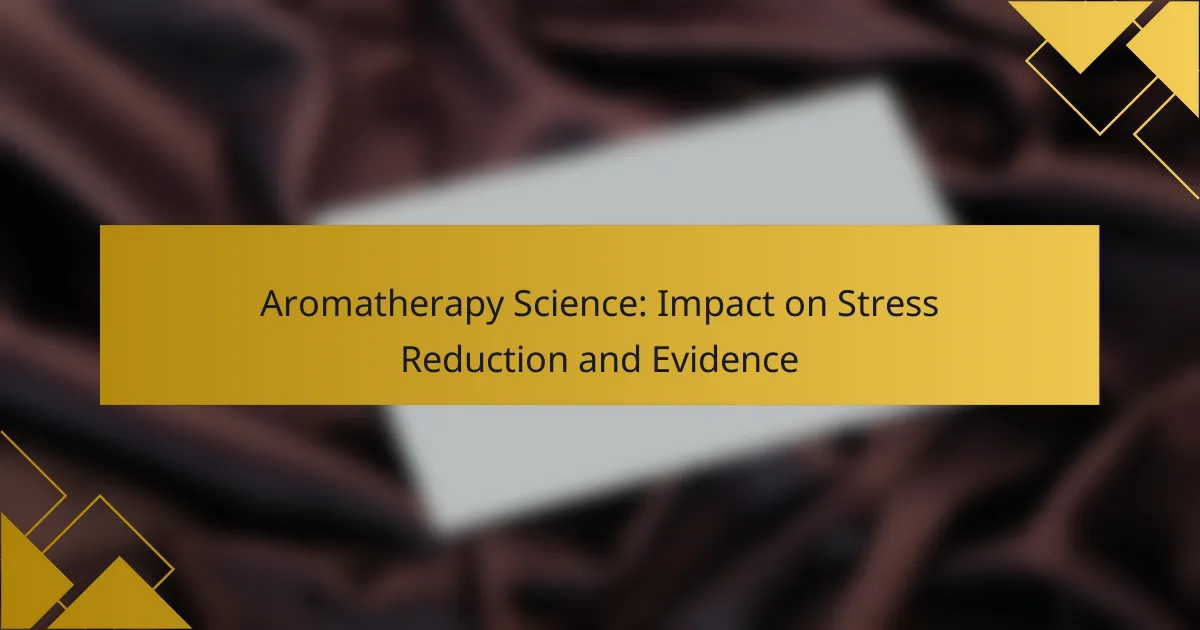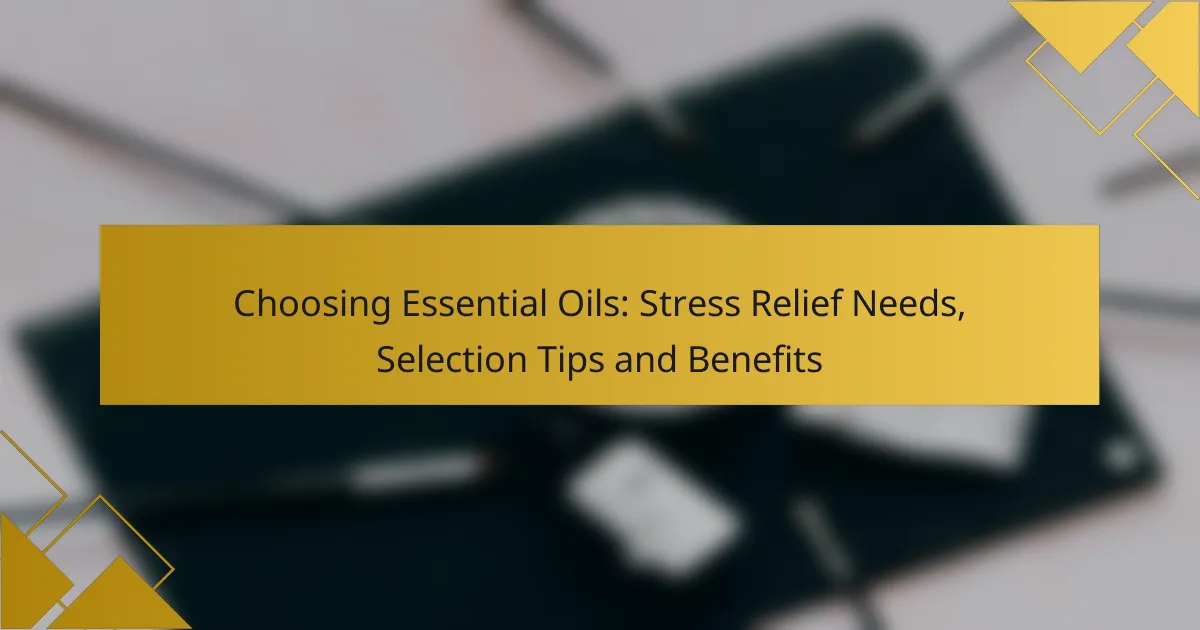When choosing between lavender and peppermint oil, it’s essential to consider their distinct properties and uses. Lavender oil excels in promoting relaxation and improving sleep quality, making it ideal for stress relief. In contrast, peppermint oil is invigorating, perfect for enhancing mental clarity and providing energy boosts, as well as alleviating headaches and digestive discomfort.
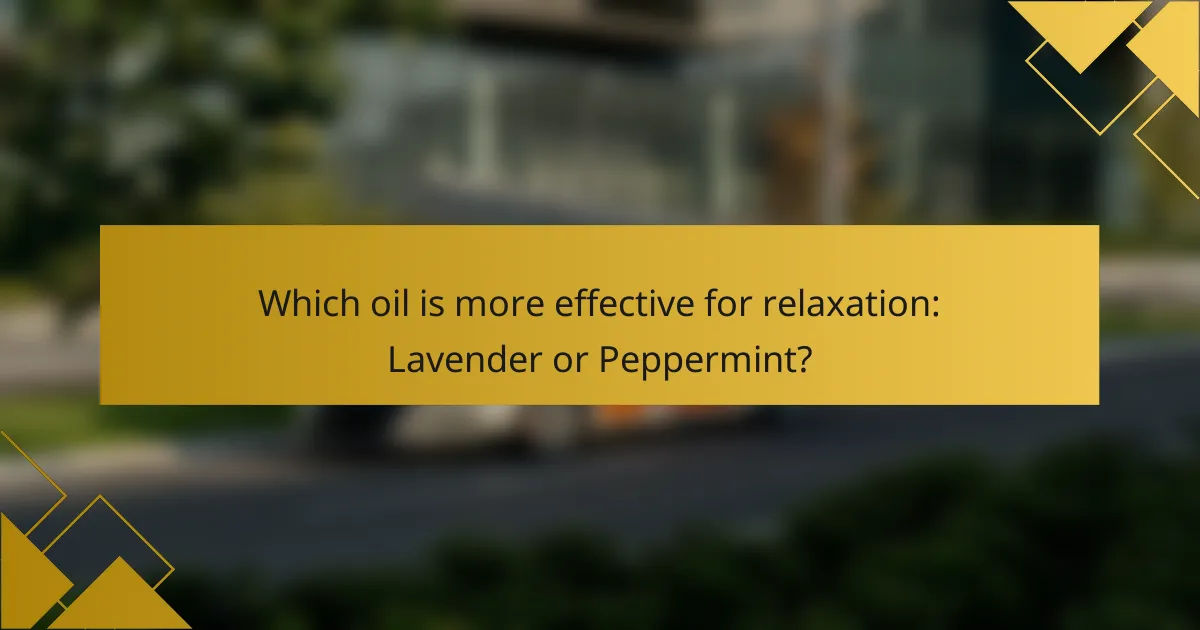
Which oil is more effective for relaxation: Lavender or Peppermint?
Lavender oil is generally more effective for relaxation compared to peppermint oil. While lavender is known for its calming properties, peppermint oil tends to invigorate and stimulate the mind.
Lavender oil promotes calmness
Lavender oil is widely recognized for its ability to reduce anxiety and promote a sense of calm. Its soothing aroma can help lower heart rate and blood pressure, making it a popular choice for relaxation practices such as aromatherapy and massage.
To use lavender oil effectively, consider adding a few drops to a diffuser or mixing it with a carrier oil for topical application. Many people find that using lavender oil before bedtime enhances sleep quality and reduces insomnia symptoms.
Peppermint oil enhances alertness
Peppermint oil is known for its stimulating effects, which can help improve focus and alertness. The fresh scent of peppermint can invigorate the mind, making it a suitable choice for situations requiring concentration, such as studying or working on tasks.
For optimal use, try inhaling peppermint oil directly from the bottle or adding it to a diffuser during work hours. However, avoid using it in the evening, as its energizing properties may interfere with sleep.

When should I use Lavender oil?
Lavender oil is best used for promoting relaxation, improving sleep quality, and enhancing overall well-being. Its calming properties make it particularly effective in various settings, especially when stress relief is needed.
For stress relief and sleep improvement
Lavender oil is widely recognized for its ability to alleviate stress and enhance sleep. Studies suggest that inhaling lavender aroma can reduce anxiety levels and promote a sense of calm. For best results, consider using lavender oil in a diffuser or applying it topically to pulse points before bedtime.
To improve sleep quality, try placing a few drops of lavender oil on your pillow or using it in a warm bath. This practice can create a soothing atmosphere conducive to relaxation and restful sleep.
In aromatherapy and massage
In aromatherapy, lavender oil is often used for its calming effects. It can be blended with carrier oils for massage, providing both relaxation and relief from muscle tension. When using lavender oil for massage, dilute it with a carrier oil, such as sweet almond or jojoba, to prevent skin irritation.
For an effective aromatherapy experience, consider combining lavender oil with other essential oils like chamomile or bergamot. This blend can enhance relaxation and create a more profound sense of tranquility during your sessions.

When should I use Peppermint oil?
Peppermint oil is best used for headaches, mental clarity, digestive support, and energy boosts. Its invigorating properties make it a popular choice for enhancing focus and alleviating discomfort.
For headaches and mental clarity
Peppermint oil is effective for relieving headaches due to its menthol content, which can help relax muscles and improve blood flow. To use it, apply diluted oil to your temples and massage gently. Inhaling peppermint oil can also enhance mental clarity and focus, making it ideal for studying or working on tasks that require concentration.
A common method is to diffuse peppermint oil in your workspace or inhale directly from the bottle. This can provide a quick boost in alertness, especially during mid-afternoon slumps.
In digestive support and energy boosts
Peppermint oil can aid digestion by relaxing the muscles of the gastrointestinal tract, which may alleviate symptoms like bloating and gas. To benefit from this, consider taking peppermint oil capsules or adding a few drops to warm water for a soothing tea.
Additionally, peppermint oil is known for its energizing effects. When feeling fatigued, inhaling the scent or applying diluted oil to pulse points can provide a refreshing lift. Just be cautious with the amount used, as too much can lead to irritation.
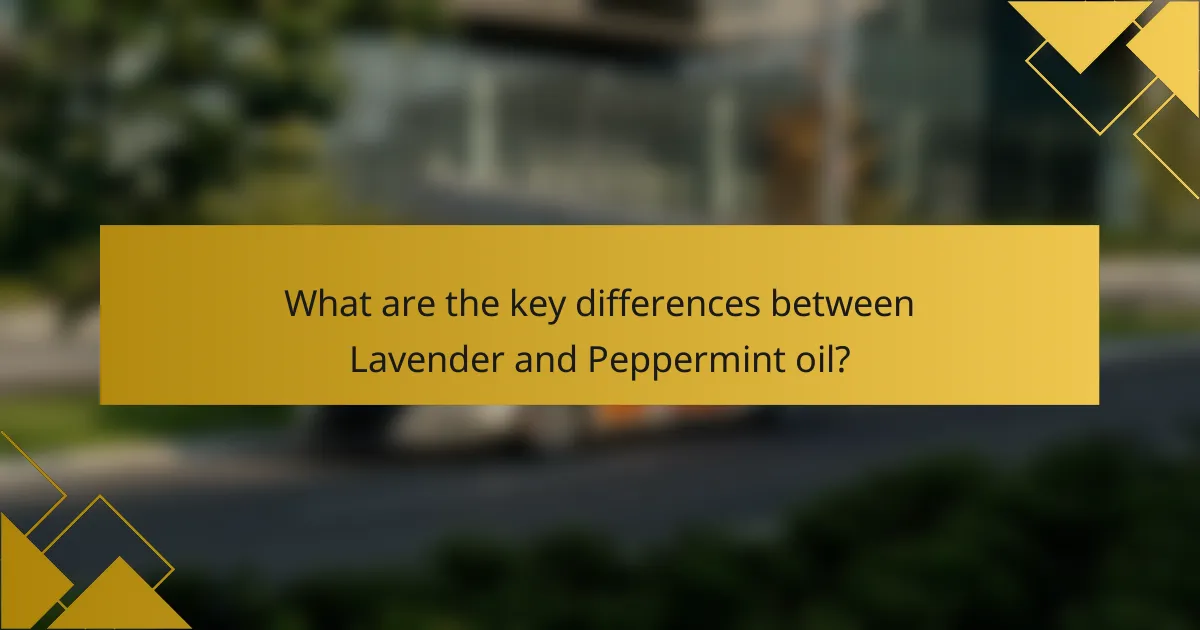
What are the key differences between Lavender and Peppermint oil?
Lavender and peppermint oils serve different purposes due to their distinct properties. Lavender oil is primarily known for its calming effects, while peppermint oil is recognized for its invigorating qualities.
Lavender oil has calming properties
Lavender oil is widely used for its soothing effects, making it a popular choice for relaxation and stress relief. Its aroma can help reduce anxiety and promote better sleep, making it ideal for use in bedtime routines.
To utilize lavender oil effectively, consider adding a few drops to a diffuser or mixing it with a carrier oil for topical application. It’s often recommended to use lavender oil in the evening or during stressful moments to maximize its calming benefits.
Peppermint oil has invigorating effects
Peppermint oil is celebrated for its refreshing and energizing properties. It can help improve focus and mental clarity, making it suitable for use during work or study sessions.
For optimal use, apply peppermint oil to pulse points or inhale its scent directly from the bottle. It’s best to use peppermint oil in the morning or when you need a mental boost, but avoid using it before bedtime as it may disrupt sleep.

How do I choose between Lavender and Peppermint oil?
Choosing between lavender and peppermint oil depends on your specific needs and preferences. Lavender is often favored for relaxation and sleep, while peppermint is typically used for energy and focus.
Consider your specific needs
When selecting an essential oil, identify the purpose you want to achieve. If you’re looking for stress relief or improved sleep quality, lavender oil is a great choice. Conversely, if you need to boost your concentration or alleviate headaches, peppermint oil may be more effective.
Consider the method of use as well. Lavender is commonly used in diffusers or added to baths, while peppermint is often applied topically or inhaled for quick relief. Understanding how you plan to use the oil can guide your decision.
Evaluate scent preferences
Your personal scent preference plays a significant role in choosing between lavender and peppermint oil. Lavender has a sweet, floral aroma that many find calming, making it suitable for relaxation spaces. On the other hand, peppermint has a sharp, invigorating scent that can enhance alertness and clarity.
It’s helpful to test both oils before making a decision. Consider using a diffuser or applying a small amount to your skin to see which scent resonates more with you. Your comfort with the fragrance will influence how effectively you can use the oil in your daily routine.

What are the safety considerations for using these oils?
When using lavender and peppermint oils, it’s essential to consider their safety profiles, as they can affect individuals differently. Lavender oil is generally safe for most people, while peppermint oil may cause skin irritation in some cases.
Lavender oil is generally safe for most
Lavender oil is widely regarded as safe for topical use and aromatherapy, making it a popular choice for relaxation and stress relief. Most individuals can use it without adverse effects, but it’s advisable to perform a patch test before applying it to larger areas of the skin.
Pregnant or nursing women should consult a healthcare provider before using lavender oil. Additionally, those with allergies or sensitivities should exercise caution and seek professional advice if unsure.
Peppermint oil may cause skin irritation
Peppermint oil can be potent and may lead to skin irritation or allergic reactions in some individuals. It’s crucial to dilute peppermint oil with a carrier oil, such as coconut or jojoba oil, before applying it to the skin to minimize the risk of irritation.
People with sensitive skin or underlying skin conditions should be particularly cautious. If irritation occurs, discontinue use immediately and consult a healthcare professional for guidance.

Can Lavender and Peppermint oil be used together?
Yes, lavender and peppermint oil can be used together effectively. When combined, they can enhance each other’s therapeutic properties, making them beneficial for various applications such as relaxation and mental clarity.
Yes, they can complement each other
The combination of lavender and peppermint oil can create a balanced aroma that promotes both relaxation and alertness. Lavender is known for its calming effects, while peppermint can invigorate the senses. Together, they can help alleviate stress and improve focus, making them suitable for use in aromatherapy or personal care products.
Using both oils in tandem may also enhance their individual benefits. For instance, lavender can help reduce anxiety, while peppermint can relieve headaches, making this duo a popular choice for holistic wellness routines.
Use in balanced proportions for synergy
To achieve the best results when using lavender and peppermint oil together, it’s important to maintain balanced proportions. A common recommendation is to use a ratio of 2:1, with two parts lavender to one part peppermint. This ensures that the calming effects of lavender are not overshadowed by the stimulating properties of peppermint.
When blending, start with small amounts and adjust according to personal preference. Always conduct a patch test before applying the mixture to the skin to avoid any adverse reactions. Additionally, consider using a carrier oil, such as coconut or jojoba oil, to dilute the essential oils for topical applications.

What are the popular brands for Lavender and Peppermint oil?
Popular brands for lavender and peppermint oil include Young Living and doTERRA, both known for their high-quality essential oils. These brands offer a variety of products that cater to different needs, making them a preferred choice among users.
Young Living for Lavender oil
Young Living is renowned for its premium lavender oil, sourced from their own farms and carefully distilled to preserve its therapeutic properties. Their lavender oil is often praised for its calming effects, making it ideal for relaxation and sleep enhancement.
When using Young Living lavender oil, consider applying it topically or diffusing it in your home. A common recommendation is to mix a few drops with a carrier oil for skin application, ensuring safety and effectiveness.
doTERRA for Peppermint oil
doTERRA’s peppermint oil is highly regarded for its invigorating scent and versatility. It can be used for various purposes, including boosting energy, alleviating headaches, and improving digestion.
For optimal use, doTERRA recommends inhaling peppermint oil directly or adding a few drops to water for a refreshing drink. Always dilute it with a carrier oil when applying to the skin to prevent irritation.






